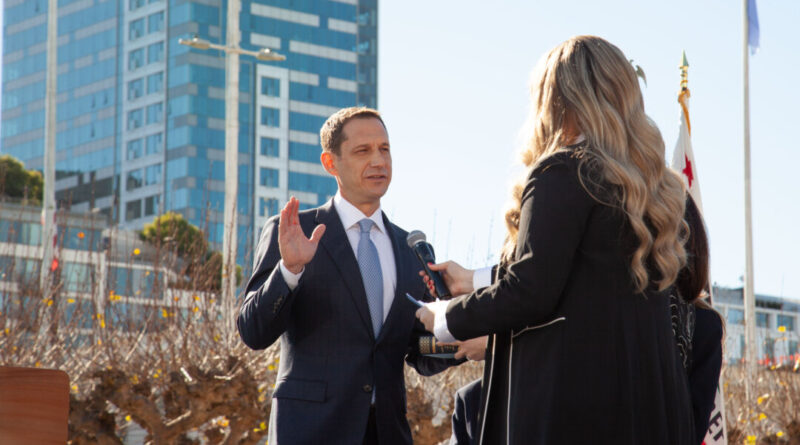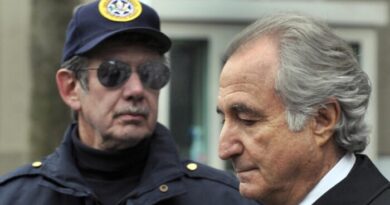Daniel Lurie Takes Office as San Francisco’s 46th Mayor, Commits to Addressing Urgent City Challenges
Tackling the drug epidemic, addressing homelessness, and revitalizing the downtown area are primary focuses for the newly inaugurated mayor’s administration.
SAN FRANCISCO—On January 8, Daniel Lurie, a non-profit founder and heir to the Levi Strauss fortune, was inaugurated as the 46th Mayor of San Francisco, attended by his wife, Becca Prowda, their children, and thousands of guests.
In his inaugural address, the new mayor emphasized his intention to create a framework in his office that promotes “greater accountability and fosters collaboration among city departments to address our most urgent challenges.”
Prioritizing the drug crisis, homelessness, and the revitalization of the struggling downtown area were established as key goals for Lurie’s administration.
“San Francisco has always been celebrated for its principles of tolerance and inclusion, but these values do not permit us to turn a blind eye to the almost 8,000 individuals living on our streets, rampant drug trafficking, public drug consumption, and the unsettling sight of individuals in distress that have stripped away our sense of safety and dignity,” Lurie remarked.
“Good intentions alone are insufficient; strong values alone are not enough. We need to proceed with a resolute focus on achieving results and implement solutions that endure well beyond this administration’s term.”
Fentanyl Crisis
Lurie announced plans to propose a series of fentanyl-related emergency ordinances to the Board of Supervisors, enabling the San Francisco Police Department (SFPD) and the Sheriff’s Department to redirect resources and personnel to hold drug dealers accountable.
The new administration intends to launch a drop-off center this spring, allowing first responders to take individuals struggling with mental health or addiction issues off the streets for treatment, providing an alternative to hospitalization or incarceration, Lurie shared.
“This initiative will improve pathways to treatment and empower law enforcement to manage those who decline assistance,” he stated.
In efforts to decrease the homeless population on the streets, Lurie mentioned plans to foster public-private partnerships to increase emergency shelter beds by 1,500 within half a year.
Additionally, he aims to expand the Journey Home Program, enhancing transportation and support for individuals ready to reconnect with family or access care beyond San Francisco.
Facing Budget Shortfalls
San Francisco is anticipating a budget deficit of approximately $799 million, with a $245 million shortfall expected in the 2025 fiscal year and a projected $554 million shortfall in 2026.
“This extensive issue necessitates making difficult choices and reevaluating our operational methods,” Lurie stated. “We must prioritize essential services and invest in crucial areas to facilitate San Francisco’s recovery.”
He pointed out that focusing investments on high-performing service providers could be a strategy for savings.
“A strategic allocation of our resources will pave the way for San Francisco’s rebound,” said Lurie.
Better coordination among departments will define his administration’s approach to cutting costs, he emphasized.
Currently, San Francisco operates at least nine street teams across five different departments. “Despite substantial investments in resources and personnel, no one believes the existing structure is functioning effectively,” Lurie asserted.
He proposed that the initial step toward streamlining the city’s crisis response should be to “mandate all departments to integrate and maintain a singular public-facing dashboard regarding street conditions.”
“Constructing effective solutions necessitates reliable data,” the mayor remarked.
Revitalizing Downtown
“Enhancing the safety and cleanliness of our streets will significantly boost the revitalization of our downtown area,” Lurie stated during the announcement of the SFPD Hospitality Zone Task Force launch.
Lurie indicated that the newly established police unit will foster a more inviting and secure environment for workers, shoppers, and visitors in Union Square, Market Street, and around the Moscone Center.
With these initiatives, Lurie expressed a sense of pride and optimism, stating, “With this momentum, we must proactively prepare for the next housing and economic revival.”
“Within our first 100 days, we will undertake significant actions to facilitate housing across all income levels and expedite permit processes for new businesses and developments,” he asserted.
DA’s Big Ask
District Attorney Brooke Jenkins voiced her expectations to the new mayor, emphasizing the need for “a more comprehensive public health strategy that doesn’t merely tolerate public drug use or leave individuals to decide when to seek help, but rather sets benchmarks for the city to achieve in getting people into treatment.”
“While we can enforce the law against drug trafficking, it’s essential that we ensure those in need of treatment are removed from our streets and receive the necessary help, rather than merely bypassing them when they express reluctance,” Jenkins noted.
The event saw attendance from Jennifer Siebel Newsom, the state’s first lady, while Governor Gavin Newsom was in wildfire-affected Los Angeles. Other notable attendees included Attorney General Rob Bonta and State Senate President Pro Tem Mike McGuire.





